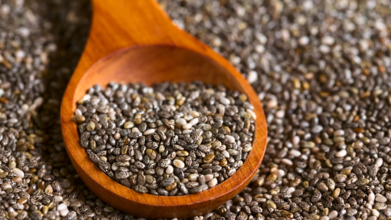- Health Conditions A-Z
- Health & Wellness
- Nutrition
- Fitness
- Health News
- Ayurveda
- Videos
- Medicine A-Z
- Parenting
- Web Stories
Everything You Need To Know About Cordyceps—A Parasitic Fungi Known To Prevent Inflammation

Credit: Canva
Cordyceps, a genus of parasitic fungi that thrive on insect larvae, has long been a staple in traditional Chinese medicine. They have not only been used to combat fatigue but also kidney disorders and even low libido. These fungi invade their host, replacing its tissue and sprouting elongated stems from the host's body. While Cordyceps contain bioactive compounds believed to benefit health, scientific research—especially human studies—is still in its early stages. Regardless, supplements containing Cordyceps extract have surged in popularity in today's world.
What's Really Special About Cordyceps?
Cordyceps may enhance the body's production of adenosine triphosphate (ATP), a molecule critical for energy delivery to muscles. This could improve oxygen utilization, particularly during exercise. There are various studies that testify to this, In 2020, a study was conducted on mice which indicated that Cordyceps extract slightly increased grip strength, likely due to enhanced ATP production.
Anti-Aging and Skin Health
Cordyceps contains polyphenols, an antioxidant which neutralises free radicals that contribute to ageing and disease. A 2024 study, which included laboratory tests and a clinical trial with 40 participants, found that Cordyceps extract exhibited adaptogenic properties, helping the body cope with stress while promoting collagen production in the skin. While this suggests potential benefits for longevity and skin health, previous studies have primarily involved animals, making further human research necessary.
Potential Anti-Cancer Properties
Test-tube studies have shown that these fungi may inhibit the growth of various human cancer cells, including in the lungs, colon, skin, and liver. A recent study conducted on mice suggested that Cordyceps may have anti-tumour effects on leukaemia, breast cancer, and lung cancer.
Diabetes and Cholesterol Management
Studies on diabetic mice suggest that Cordyceps may help lower blood sugar and lipid levels, potentially aiding in the management of diabetes and atherosclerosis. Lipid levels indicate the amount of fat, including cholesterol, in your blood. A recent research paper, published in Journal Of Korean Medicine, concluded that "Cordyceps militaris extract has more positive effects than metformin on body weight, insulin resistance, sugar metabolism, fatty liver, and inflammation in diabetic mice. It also has a similar positive effect as metformin on blood lipid concentration and liver damage. This suggests the potential of diabetes management in Cordyceps militaris extract."
Boost To Heart Health
Cordyceps may contribute to cardiovascular health by reducing oxidative stress, which can lead to heart enlargement. A 2019 study on mice found that Cordyceps helped prevent cardiac hypertrophy, possibly due to its adenosine content, a compound known for heart-protective properties. Additionally, Cordyceps may help regulate blood fats like triglycerides, potentially reducing heart disease risk.
Anti-Inflammatory Effects
While short-term inflammation plays a crucial role in healing, chronic inflammation can contribute to various diseases. Research from 2020 suggests that Cordyceps may suppress inflammatory proteins in human cells. Additionally, animal studies have shown potential benefits in reducing inflammation related to arthritis, asthma, and allergic rhinitis. However, human studies are lacking in this area.
ALSO READ: Can You Get Bird Flu From Eating Chicken? List Of Foods You Should Avoid
Never Eat Chia Seeds THIS Way: Doctor Warns Of Hidden Dangers

(Credit-Canva)
Chia seeds have earned their reputation as a popular superfood for good reason. They are packed with healthy nutrients like omega-3 fatty acids, which are great for your brain and heart. They also contain a lot of fiber, which helps with digestion and keeps you feeling full, and antioxidants, which protect your body from damage. These little seeds can be a great addition to your diet for a healthier heart, better digestion, and help with weight management. But there's a catch: you have to prepare them the right way.
We have all heard of the benefits of chia seeds and many health coaches also explain why it is important to eat it better. However, what many people do not realize is that unlike other foods, that can be consumed either way, prepared or raw, chia seeds need to be prepared before you have them.
How To Eat Chia Seeds The Right Way?
The reason you have to be careful with chia seeds is because of their incredible ability to absorb liquid. They can soak up a huge amount of water—up to 12 or even 27 times their dry weight! This is what gives them that satisfying, filling quality. However, if you swallow them dry and then drink water, they can start to expand right inside your body.
According to medical experts like Dr. Karan Sood and gastroenterologist Dr. Saurabh Sethi, this can be very dangerous. In one well-known case, a man swallowed a spoonful of dry seeds with some water, and they swelled up so much that they created a blockage in his throat. While this is rare, it's a serious risk, especially for people who have trouble swallowing or have other digestive issues. In some cases, doctors have had to perform a procedure to remove the stuck seeds from a person's esophagus.
How Can You Avoid Chia Seed Dangers?
To avoid any risks, the most important rule is to always soak chia seeds before you eat them. It's a simple step that makes a huge difference. You should let them soak for at least 10 to 15 minutes, but leaving them in liquid overnight is even better. This process allows the seeds to fully absorb the water and form a soft, gel-like texture. This gel is not only safe to eat, but it also helps with digestion.
If you're new to eating chia seeds, it's smart to start with a small amount, like just one teaspoon, and slowly add more to your diet over time. Also, remember that since they absorb so much moisture, you should drink plenty of water throughout the day to stay hydrated. If you're ever unsure about adding them to your diet, it's best to check with your doctor first to make sure they're right for you.
Chia seeds are a great source of fiber and you can increase your chia seed intake by adding a spoonful in your water bottle, or in overnight puddings with milk along with the fruits, making it an easy and excellent breakfast.
Diet For Mental Health: How Keto Helps With Depression

Credits: Canva
The ketogenic (keto) diet is best known for weight loss and blood sugar control, but emerging research suggests it may also play a role in supporting mental health. Specifically, the high-fat, very low-carb diet appears to have several effects on the brain and nervous system that could ease symptoms of depression. At the same time, certain aspects of keto may worsen mood in some individuals, making it important to weigh both benefits and risks.
Before You Try Keto
Before starting any new diet, it’s crucial to consult both your primary care physician and a qualified mental health professional. Keto is restrictive and can cause significant shifts in metabolism. A doctor can help determine whether it’s safe for your physical health, while a mental health expert can advise on whether dietary changes may support your treatment plan.
How Keto May Improve Mood and Relieve Depression
May Increase GABA
Gamma-aminobutyric acid (GABA) is a neurotransmitter that helps calm the nervous system, regulating stress, anxiety, and mood. As per a 2021 study published in Progress in Neuro-Psychopharmacology and Biological Psychiatry, low levels of GABA have been linked to depression. Animal studies suggest that the ketogenic diet can raise GABA activity, which may contribute to improved mood stability and a reduction in depressive symptoms. However, more human trials are needed to confirm this effect.
May Improve Mitochondrial Function
Mitochondria are often called the “powerhouses” of cells because they generate adenosine triphosphate (ATP), the compound that fuels cellular activity. Research indicates that people with depression may have lower ATP levels in the brain. A 2020 study published in the American Journal of Physiology found that when combined with exercise, a ketogenic diet may boost ATP production, potentially improving brain energy metabolism and mood.
May Decrease Oxidative Stress
Oxidative stress occurs when free radicals, unstable molecules produced through metabolism or environmental exposure, damage cells. Elevated oxidative stress has been observed in people with depression and is linked to poor brain health. Following a keto diet may reduce oxidative stress markers and enhance antioxidant defenses, which could protect brain cells and ease depressive symptoms.
May Regulate Insulin Function
Insulin not only manages blood sugar levels but also influences brain function. Insulin resistance, where the body becomes less responsive to insulin, is associated with type 2 diabetes, obesity, and even depression. Evidence shows that the ketogenic diet can improve insulin sensitivity, which may in turn help regulate mood and lower depression risk.
May Decrease Inflammation
Chronic inflammation has been strongly associated with depression. The ketogenic diet, which reduces carbohydrate intake, may lower inflammatory markers in the body. By decreasing inflammation, keto could help alleviate mood disturbances linked to inflammatory processes.
How Keto May Worsen Depression
While keto offers potential benefits, it can also have drawbacks that affect mental health.
Restriction and Food Deprivation
Keto requires cutting out sugar, starch, legumes, and many fruits and vegetables. For some, the loss of “comfort foods” or the stress of making major dietary changes can lead to feelings of deprivation and sadness.
Nutrient Deficiencies
Eliminating whole food groups may result in deficiencies in key nutrients like B vitamins, vitamin D, magnesium, zinc, selenium, iron, calcium, and omega-3 fatty acids—all of which are linked to mood regulation. Deficiencies in these nutrients may worsen or trigger depression.
Social Isolation
Food plays a central role in social life, from family dinners to gatherings with friends. Because keto often requires special meal preparation and avoidance of common foods, people may find themselves eating at home more often or feeling isolated in social situations. This lack of connection can contribute to depressive episodes.
The ketogenic diet may positively influence brain health by boosting GABA, improving mitochondrial function, reducing oxidative stress, regulating insulin, and lowering inflammation, all factors connected to depression. However, its restrictive nature, risk of nutrient deficiencies, and potential for social isolation mean it is not suitable for everyone.
If you are considering keto for mental health, it is best approached under medical and psychological supervision. While early research is promising, more human studies are needed to fully understand how this diet affects depression.
Many Yogurts Have More Sugar Than Soda, According To Harvard Gastroenterologist

Credits: Canva
Not all fermented foods are healthy for you. In fact, many yogurts have more sugar than soda. Dr. Saurabh Sethi, a gastroenterologist trained at AIIMS, Harvard, and Stanford, recently shared on Instagram that the fermented food that you get from supermarket, like pickles, in fact do not have live bacteria in it. So, in a way they do not help your gut health at all.
Fermented foods like kimchi, yogurt, and kombucha have become wellness buzzwords, often praised for their gut-healing powers. But not everything marketed as “fermented” or “probiotic” actually benefits your digestive system.
To clear up the confusion, Dr Sethi, recently shared on Instagram the seven most common mistakes people make when eating fermented foods, and how to enjoy them safely.
Not All Fermented Foods Have Live Probiotics
One of the biggest misconceptions is assuming that every fermented product is rich in probiotics. Dr Sethi points out that most packaged pickles on store shelves don’t contain live bacteria. The real probiotic powerhouses are kefir, yogurt, dahi, buttermilk, kimchi, and sauerkraut. If you’re looking for gut-friendly microbes, stick to these options rather than vinegar-based or shelf-stable pickles.
Heat Kills Probiotics
It’s important to know that probiotics are delicate. When foods like kimchi or sauerkraut are cooked, their beneficial bacteria die off. That means adding sauerkraut to hot soups or frying kimchi with rice won’t give you the probiotic boost you expect.
Traditional Indian foods like idli, dosa, and dhokla are made through fermentation, which improves digestibility, but most live cultures don’t survive steaming or frying. To get the probiotic benefits, eat fermented foods raw or in minimally processed forms.
Yogurt Isn’t Always Probiotic
This is where most people go wrong. Many store-bought yogurts are marketed as “healthy” but contain more sugar than a can of soda. Worse, not all have live cultures. Dr Sethi recommends checking the label for the phrase “live and active cultures.” Without that, you’re mostly just eating flavored dessert. If possible, choose plain yogurt, homemade dahi, or sugar-free varieties.
Variety Matters
Even if you pick the right foods, sticking to just one won’t maximize your gut health. For example, eating the same yogurt every day introduces only a limited range of bacteria. The gut microbiome thrives on diversity. Dr. Sethi suggests rotating between kefir, kimchi, miso, sauerkraut, and kanji to expose your digestive system to a broader spectrum of beneficial microbes.
Fermented Doesn’t Mean a Cure-All
Probiotics are helpful, but they are not magic. Fermented foods support gut health, but they cannot replace the benefits of fibre, fruits, vegetables, and a balanced diet. Over-relying on kombucha or kimchi while ignoring whole grains and fresh produce won’t give you long-term digestive health. Think of fermented foods as one piece of the puzzle, not the entire solution.
Start Slow
Adding too many probiotics too quickly can overwhelm your system. Gas, bloating, and stomach discomfort are common when you suddenly increase your intake. Dr. Sethi advises starting small, just a few spoonfuls of fermented food daily, and then gradually increasing the amount as your gut adjusts.
Storage Matters
Not every jar labeled “fermented” actually contains probiotics. Shelf-stable pickles and chutneys, often preserved with vinegar or pasteurization, usually have no live bacteria left. For real probiotic benefits, choose refrigerated options such as fresh pickles, sauerkraut, kimchi, yogurt, or homemade drinks like dahi, lassi, and kanji.
© 2024 Bennett, Coleman & Company Limited

